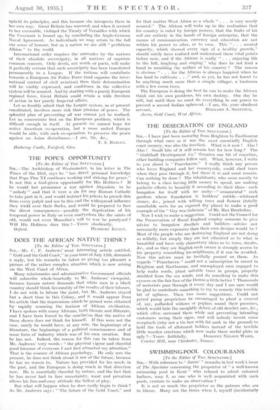DOES THE AFRICAN NATIVE THINK ?
[To the Editor of THE SPECTATOR.] Sin,—Mr. C. F. Andrews' most interesting article entitled, " Gold and the Gold Coast," in your issue of July 12th, demands a :reply, lest his remarks be taken as giving too pleasant a picture of the rather complex situation which is now arising on, the West Coast of Africa.
Many missionaries and administrative Government officials will subscribe whole-heartedly to Mr. Andrews' viewpoint, because human nature demands that white men in a black country should think favourably of the results of their labours. I do not wish to labour the point, but Mr. Andrews stayed but a short time in this Colony, and it would appear from his article that the impressions which lie gained were obtained by rapidly scanning the horizon of African civilisation. I have spoken with many Africans, both literate and illiterate, and I have been forced to the conclusion that the native of these shores does not think. for himself. If this were not the case, surely he would have, at any rate, the beginnings of a literature, the beginnings of a political consciousness and of some form of industry which was of his own creation. But he has not. Indeed, the reason for this can be taken from 14, Andrews'. very words " the physical vigour and cheerful good himiour of everyone I met firSt attracted my attention." That is the essence of African psychology. He only sees the present, he does -not think about it nor of the future, because he has no reason to. Nature has provided for his needs in the past, and the ,European is. doing much in that direction now. , He is essentially cheerful by nature, and the fact that he has' never had to face uncertainty, want and privation allows his free-and-easy attitude the fullest of play.
But what will happen when he does really begin to think ? As Mr. Andrews says " The future of the Gold Coast," and for that matter 'West Africa as a whole " . . . is very nearly assured." The African will wake up to the realisation that his country is ruled by foreign powers, that the fruits of his soil are entirely in the hands of foreign enterprise, that the means of communication, currency and education are not within his power to alter, or to own. This " . . . mental capacity, which showed every sign of a healthy growth," should surely have realised and understood these vital points before now, and if the African is really " . . . enjoying life to the full, laughing and' singing," why does lie not lend a hand in moulding the welfare of his country ? The reason is obvious " . . . for the African is always happiest when he has land to cultivate . . ." and, as yet, he has not learnt to be anything much more than a simple villager, a bushman with a few cocoa trees.
The European is doing the best he can to make the African think out his own problems, his own destiny. One day he will, but until then we must do everything in our power to prevent a second Indian upheaval.—I am, Sir, your obedient
servant, BERNARD A. SISATTOCN. Accra, Gold Coast, West Africa.


































 Previous page
Previous page